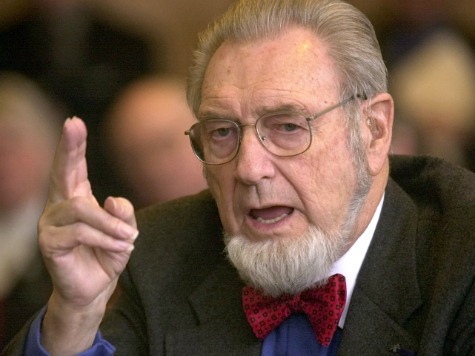
HANOVER, N.H. (BP) — Former U.S. Surgeon General C. Everett Koop, widely credited with energizing evangelicals against abortion, died peacefully Feb. 25 at his home in Hanover, N.H., at age 96.
The trailblazing pediatric surgeon developed a reputation as a preserver of life not only through groundbreaking surgeries and medical procedures, but through a morally, biblically based platform against sexual promiscuity and abortion, most notably before and after his two terms in the 1980s as surgeon general.
Koop also promoted the power of prayer in conjunction with medical science, famously praying at the bedsides of his patients.
In the 1979 book “Whatever Happened to the Human Race?” Koop and the late Frances Schaeffer made a case for the importance of mankind’s intrinsic God-given value in the preservation of humanity.
“If man is not made in the image of God, nothing then stands in the way of inhumanity. There is no good reason why mankind should be perceived as special. Human life is cheapened,” the two wrote. “We can see this in many of the major issues being debated in our society today: abortion, infanticide, euthanasia, the increase of child abuse and violence of all kinds, pornography (and its particular kinds of violence as evidenced in sadomasochism), the routine torture of political prisoners in many parts of the world, the crime explosion, and the random violence which surrounds us.”
Koop and Schaeffer endeavored to “awaken the evangelical world — and anyone else who would listen — to the Christian imperative to do something to reverse the perilous realignment of American values on these life-and-death issues” including abortion and infanticide, Koop reflected in his 1991 autobiography, “Koop: The Memoirs of America’s Family Doctor.”
Southern Baptist ethicist Richard Land has written that “it is difficult to overestimate the incredible impact” Koop and Schaeffer had on evangelicals in the 20th century.
“Everyone devoted to the pro-life cause owes an incalculable debt of gratitude to Francis Schaeffer and to Dr. C. Everett Koop,” Land wrote for National Right to Life in 2003. “First Schaeffer, and then Dr. Koop, helped inform and energize a whole generation of evangelical Christians to engagement with a culture that had veered dangerously off course from its Judeo-Christian foundations. The pro-life movement owes them an enormous debt.”
C. Ben Mitchell, professor of moral philosophy at Union University in Jackson, Tenn., hailed Koop’s legacy.
“We have lost the nation’s doctor,” Mitchell told Baptist Press. “As a gifted physician and faithful Christian, he taught us how to heal both body and soul. As a public servant he helped us navigate some tumultuous waves, even causing a few of his own. As a protector of human dignity and the sanctity of human life he cared for the tiniest and most vulnerable among us.”
After the U.S. legalized abortion, Koop predicted the practice would lead to infanticide, passive and active euthanasia and toward a political climate that, in Nazi Germany, led to Auschwitz and other concentration camps, according to news accounts of his speeches.
Koop, a Presbyterian, vowed during confirmation hearings before the U.S. Senate not to use his post as surgeon general to promote his religious ideology and occasionally angered evangelicals as he worked to keep his pledge.
Koop provoked controversy among evangelicals by encouraging sex education in elementary school, the use of condoms to prevent sexually transmitted diseases and compassionate health care for AIDS patients, who were then overwhelmingly within the homosexual community. Yet personally, he opposed homosexuality and promoted pre-marital sexual abstinence.
Among Koop’s other initiatives were calls for a smoking ban and campaigns promoting healthy eating and physical exercise education.
Melinda Delahoyde, president of the Care Net crisis pregnancy centers which Koop helped found, mourned Koop’s death.
“Dr. Koop took a courageous stand on the issue of life when not many were willing to do the same,” Delahoyde wrote on Care Net’s website. “He truly made a lasting impact, as his legacy lives on today through Care Net’s life-saving work to people facing unplanned pregnancies.”
As surgeon-in-chief at Children’s Hospital in Philadelphia, Koop pioneered surgery on newborns, successfully separating three sets of conjoined twins and reconstructing the chest of a baby born with the heart outside the body.
Koop’s recent outreach includes a letter he wrote in 2009 to Sen. Harry Reid urging that congressional health care legislation include a provision allowing doctors and medical students to opt out of performing abortions.
Koop was born Oct 14, 1916, in Brooklyn, N.Y., and, according to Reuters News, became interested in medicine after being badly injured as a child in a skiing accident and in playing football.
He was preceded in death by his first wife, Elizabeth, and by their son David. He is survived by their children Allen Koop, Norman Koop and Elizabeth Thompson, as well as by his second wife Cora, whom he married in 2010, according to news reports.
–30–
Diana Chandler is Baptist Press’ staff writer. Get Baptist Press headlines and breaking news on Twitter (@BaptistPress), Facebook (Facebook.com/BaptistPress ) and in your email ( baptistpress.com/SubscribeBP.asp).
















